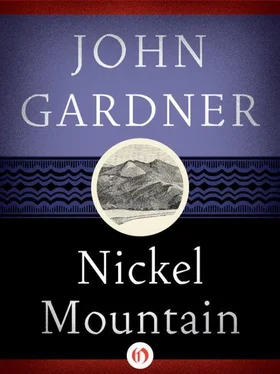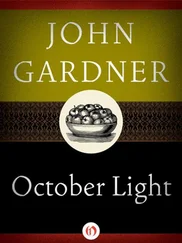Then one afternoon the troopers called. Callie answered the phone. She came running into the diner, carrying Jimmy (he had to be with someone constantly, these days; Simon’s attentions had spoiled him). As soon as she was inside the door, she called, “Henry, that was the troopers. They think they may have found who set the fire.”
Henry went cold. He hadn’t realized until this moment how far his trust was removed from his rational judgment. “Who did it?” he said.
“They think it was a couple of kids,” she said. She hiked Jimmy up a little, getting a better hold on him. “They don’t know, you understand, they just think. Two teen-agers. The troopers are on their way up here with them now. They want them to see Simon face to face.”
Henry thought: Thank God he didn’t do it! But carefully he cut God from what he said. “Then he didn’t do it.”
“It’s not sure, but they think not.”
Then: “Where is he? I’ll go tell him the news.”
“I don’t know,” Henry said. “In back, I guess.”
She left, still carrying Jimmy.
Henry’s legs went weak. He went over to the corner booth and sat down. He leaned his forehead on his fists and breathed deeply, and it was as if all his stomach had turned to jelly. He was still there when Callie came back, walking slowly, Jimmy walking beside her. Henry looked up. “What did he say?”
For what seemed half-a-minute she didn’t answer. At last she said with a despairing look, “If they did it, he forgives them.”
“The boys?” Henry waited.
She said, “Love thine enemies, bless them that curse you, do good to them that hate you. Thus saith Simon Bale.”
Henry snorted. “He’ll change his mind when he sees them.”
She shook her head. “I don’t think so.”
“The fire killed his wife,” Henry said.
“It won’t make any difference,” she said. “I’m telling you, Henry. He’s strange, really strange.”
Her prediction turned out to be right, but Simon’s behavior was, as Simon would have said, of no importance. The law was still the law.
The nightmares were nothing to worry about, Doc Cathey said. All children had occasional spells of that sort, some children longer spells than others; in any case, he’d grow out of them. He made them a list of foods they shouldn’t give him within two hours of bedtime, and he warned them of scolding him too severely. Aside from that, there was nothing to do but wait. There was no question of there being any deep psychological disturbance, he said. He was sunny-dispositioned, placid, in a word, healthy.
They were relieved. Nevertheless it was a terrible moment when that scream would come, jerking them out of their sleep like a wire. It happened every two, three nights, sometimes twice in a single night. Henry would bound to Jimmy’s bedside and scoop him up and say, “What’s the matter? Bad dream?” They would never get out of him what it was he was dreaming about. It was hard enough to get the most ordinary information out of a two-year-old. Jimmy could talk well enough when he wanted to — in long, fairly complicated sentences, his eyes large and watchful, scrutinizing Henry’s face for the first sign that the sentence had gone wrong. But it wasn’t easy to make him advance information. He preferred to copy sentences he’d heard (in the morning they’d hear him practicing for half an hour at a time in his room, new expressions, new tones of voice). So what it was he was dreaming they never learned. Perhaps he forgot it all instantly, the minute he awakened. That was Henry’s theory, because often Jimmy would go back to sleep at once, the minute Henry scooped him up, and sometimes he’d be asleep again even when Henry reached his bedside. At the end of the second week the spell seemed to be over. He went five nights in a row without crying out (it was Callie who kept track), and they began to breathe more easily.
They had another reason, too, for beginning to feel hopeful. On the Monday night a month and three days after Simon’s first coming, Simon packed himself a lunch and drove down the mountain to the Grant Hotel. Henry and Callie had no idea when or how he’d gotten in touch with the man who owned the place to tell him he was coming back; in fact, until Simon got home, at seven-thirty the following morning, they had no idea where he’d gone. He left again the next night, and Henry said to Callie’s mother, when they were standing in the diner with nothing to do (it was ten-thirty, always the slackest time of day), “Well, Ellie, Simon’s started working again. He’ll be on his feet in no time now. We’ll soon see the last of him.”
“I imagine Callie’s pleased about that,” she said. Henry smiled at her restraint. But she could not help adding, “I wonder how they feel about it at the Grant.”
And when George Loomis came in that night, Henry said, “Well, he’s gone back down to work, George. Must mean it won’t be much longer.”
“Maybe,” George said.
Henry laughed at George’s skepticism. He went on chuckling, wiping off the counter; but something unpleasant began to nag at the back of his mind, and he could neither shake it nor make out what it was.
Again, Wednesday night, Simon went down to the hotel.
Doc Cathey said, “He’s a different man when he’s working. And you’re a different man too, I’ll say that.”
“Different how?” Henry said. “Simon, I mean.”
Doc Cathey shrugged, then tipped his head and thought about it, chewing the inside of his cheek. “Oh, tougher, I guess. More sure what he’s about. I’ve noticed it before. You take a man that’s different from everybody else around him and when he’s holding down a job he’ll do things he’d never even think of some other time.”
Henry considered it. “It may be,” he said. “I hadn’t noticed it. Maybe so. I’m glad to see him pulling his life back together, just the same. You have to hand it to him, man fifty-four years old that’s gone through what Simon has.”
Doc Cathey went on chewing his cheek. Henry went over to clean the booth where Nick Blue had had his supper, and as he stacked the dishes he began to whistle under his breath. But it wasn’t good spirits pure and simple.
Again on Thursday night Simon Bale went down to the Grant. He returned at seven-thirty the next morning, and Callie fixed him toast and eggs. When he’d eaten he went into his room and shaved with his electric razor, then took off all but his dirty underwear and went to bed. He got up around two in the afternoon and went out to sit in the garden, reading his Bible. (It had rained that morning. The garden was muddy and the bench soaking wet, but Simon seemed not to notice.) Jimmy wandered around looking for him, as soon as he discovered that Simon wasn’t in bed, and finally, smiling, shaking her head at the thought of the mess she would have to clean up when the mud got him, Callie led him out the back door. He ran-slid along between the glittering lettuce and beets to the rose bushes and between the bushes to the bench where Simon sat. Callie smiled again, thinking how hard they’d all been on Simon, after all: However crazy he might be, some ways, there was something good in him or Jimmy wouldn’t hang on him that way. After that she called into the diner to Henry to ask him if he’d remembered to bring in the mail, and when he said no, he was sorry, he’d forgotten, she went around to the mailbox out in front. There was nothing much — something from Farmers’ Insurance, one of those Occupant circulars, the monthly statement from the bank. She opened the statement, without much interest, as she started back to the house.
He saw the canceled check to Wiegerts’ lying alone in the middle of the kitchen table, and his breath went out of him. He got the bottle of pills in the pocket of his shirt. Callie wasn’t in the house, and she wasn’t in the diner either. I’m sorry, he thought. It was all I could do. But that was no good and he didn’t want it. He’d done it and he would take whatever fury or grief was coming, because though it was all he could do he’d nevertheless chosen to do it, and it was as though the act were not his fate’s but his own. It came to him then where she would be, out on the highway crying and walking off her rage or, no, fear — that sensation like falling through endless space, the feeling she’d learned from sixteen years of living through the battles of her mother and father. He thought of driving out to hunt for her, but then he couldn’t make out whether he ought to or not: Maybe she was better off getting through it on her own. She knew he was not her father, or anyway that his foolishness was a different kind of foolishness (except that he was not going to admit for a minute that what he had done was foolishness, finally, and maybe Callie would make out even that, he didn’t know). He decided to see if she was back in half-an-hour, and if not, to go look for her.
Читать дальше











